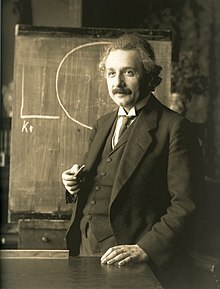| Albert Einstein | |
|---|---|
 Albert Einstein in 1921 |
|
| Born | 14 March 1879 Ulm, Kingdom of Württemberg, German Empire |
| Died | 18 April 1955 (aged 76) Princeton, New Jersey, United States |
| Residence | Germany, Italy, Switzerland, Austria, Belgium, United Kingdom, United States |
| Citizenship |
|
| Fields | Physics |
| Institutions | |
| Alma mater | |
| Doctoral advisor | Alfred Kleiner |
| Other academic advisors | Heinrich Friedrich Weber |
| Notable students | |
| Known for | |
| Notable awards |
|
| Spouse | Mileva Marić (1903–1919) Elsa Löwenthal (1919–1936) |
| Signature |
|
Kamis, 24 Januari 2013
Einstein" redirects here. For other uses, see Einstein (disambiguation).
Albert Einstein (pron.: /ˈælbərt ˈaɪnstaɪn/; German: [ˈalbɐt ˈaɪnʃtaɪn] ( listen); 14 March 1879 – 18 April 1955) was a German-born theoretical physicist who developed the general theory of relativity, effecting a revolution in physics. For this achievement, Einstein is often regarded as the father of modern physics[2][3] and the most influential physicist of the 20th century. While best known for his mass–energy equivalence formula E = mc2 (which has been dubbed "the world's most famous equation"),[4] he received the 1921 Nobel Prize in Physics "for his services to theoretical physics, and especially for his discovery of the law of the photoelectric effect".[5] The latter was pivotal in establishing quantum theory.
listen); 14 March 1879 – 18 April 1955) was a German-born theoretical physicist who developed the general theory of relativity, effecting a revolution in physics. For this achievement, Einstein is often regarded as the father of modern physics[2][3] and the most influential physicist of the 20th century. While best known for his mass–energy equivalence formula E = mc2 (which has been dubbed "the world's most famous equation"),[4] he received the 1921 Nobel Prize in Physics "for his services to theoretical physics, and especially for his discovery of the law of the photoelectric effect".[5] The latter was pivotal in establishing quantum theory.
Langganan:
Posting Komentar (Atom)

Tidak ada komentar:
Posting Komentar